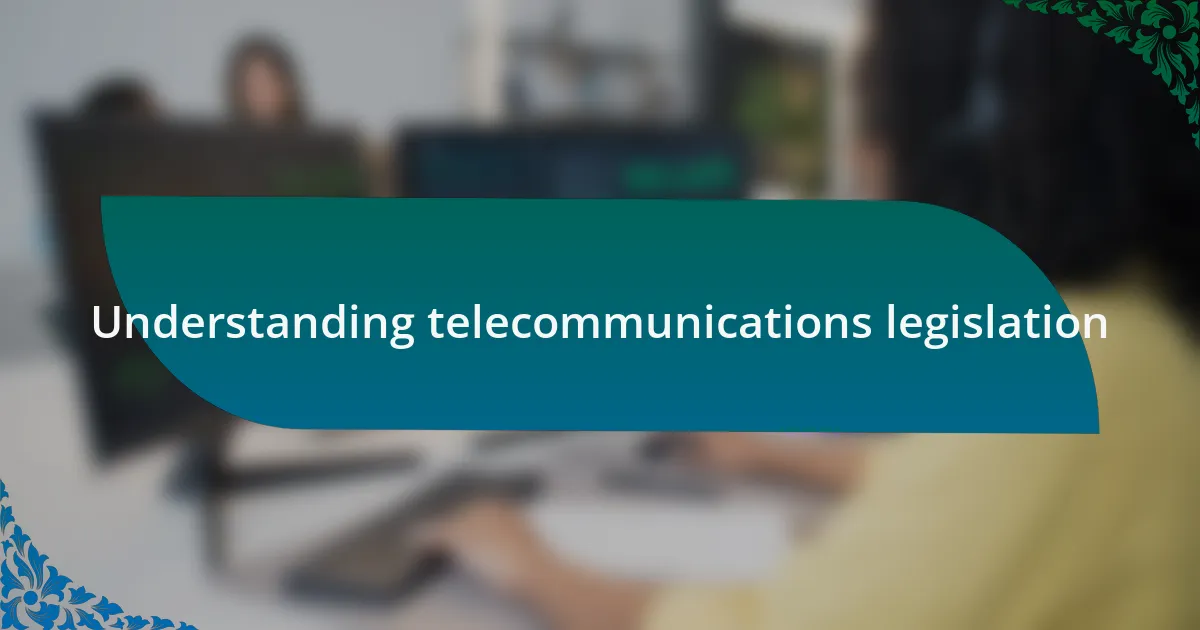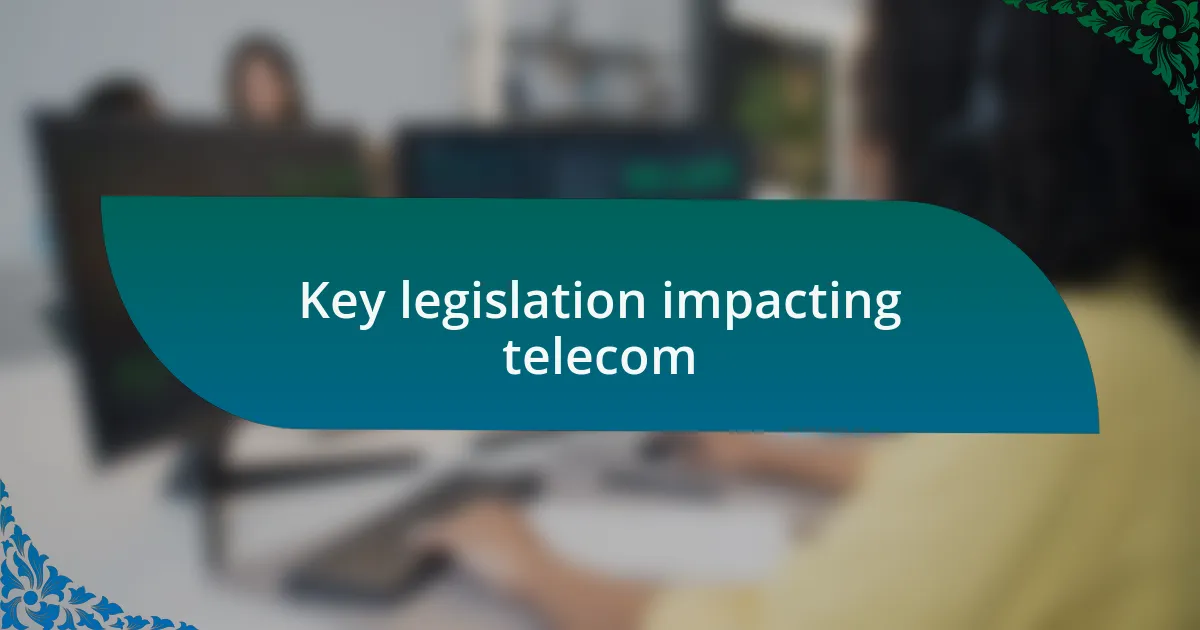Key takeaways:
- Telecommunications legislation influences innovation, consumer protection, and competition in the market.
- Key regulations, such as the Telecommunications Act of 1996 and the Universal Service Fund, promote market entry and equitable access to services.
- Compliance with telecom regulations poses challenges due to rapid changes, complex language, and costs, particularly affecting smaller companies.
- Proactive approaches and strong team communication can enhance compliance efforts and foster innovation in the face of regulatory demands.

Understanding telecommunications legislation
Telecommunications legislation may seem dry at first glance, but I find it fascinating how these laws shape the very fabric of our communication landscape. Just think about it: every time we pick up our phones or log onto the internet, we’re interacting with systems influenced by complex regulations. I remember a time when I was trying to navigate the intricate web of compliance rules for a new service rollout; it was like solving a puzzle where one piece was missing.
What often strikes me is how legislation can either empower or stifle innovation. For instance, after a big regulatory change in my region, I saw numerous startups flourish, adapting to the new rules with creative solutions. Have you ever considered how these changes can create opportunities in unexpected places? It’s a reminder that while legislation sets the stage, it’s the ingenuity of individuals and companies that brings the play to life.
Moreover, the emotional aspect of understanding these laws can’t be overlooked. As someone who has faced the consequences of legislative shifts, I’ve experienced frustration and excitement in equal measure. What challenges have you encountered due to regulatory developments in telecommunications? I often reflect on how the balance between consumer protection and technological advancement is a constant tug-of-war that affects us all.

Importance of telecom regulations
Regulations in telecommunications play a crucial role in safeguarding consumer interests. I recall a case where a new policy mandated clearer communication of service terms, which drastically improved customers’ understanding of their contracts. Have you ever felt frustrated by hidden fees or unclear terms? This regulation has often empowered customers to make informed choices, ultimately fostering a more transparent marketplace.
Another vital aspect of telecom regulations is their ability to promote fair competition. I remember attending an industry conference where several experts discussed how rules preventing monopolistic practices helped new players enter the market. Isn’t it invigorating to see small companies thrive alongside giants? This healthy competition encourages innovation, pushing all companies to improve their services and technology.
Lastly, I’ve seen firsthand how regulations can ensure equitable access to communication services, particularly in underserved areas. A few years ago, I volunteered for a charity that aimed to provide internet access to rural communities. During this experience, it became clear how vital regulations were in promoting infrastructure investments in those regions. Have you ever thought about how many people might be left behind without these regulatory frameworks? It’s an emotional reminder that legislation can bridge gaps, enabling connectivity for everyone.

Overview of telecom technology
Telecom technology encompasses a vast array of tools and systems that facilitate communication across distances. I remember the excitement I felt during a tech expo when I first encountered advanced fiber-optic systems, which dramatically enhance speed and reliability. Have you ever experienced lagging connections and wished for seamless communication? That’s where these innovations come into play, transforming our daily interactions.
At the heart of this sector are essential components like switches, routers, and signaling systems. These elements work together to enable everything from simple phone calls to complex data exchanges over the internet. In my career, I’ve worked closely with engineers developing these systems, and it’s awe-inspiring to see how each piece contributes to the overall functionality. It’s like a well-choreographed dance, where each part must perform perfectly for the whole to thrive.
Moreover, telecom technology continually evolves, shaping our communication landscape. I can’t help but reflect on how significantly mobile technology has transformed our society, allowing us to connect anytime, anywhere. Does it ever amaze you how this change has influenced our work and social lives? As we embrace advancements like 5G and the Internet of Things, I see an endless potential for even more profound transformations ahead.

Key legislation impacting telecom
Key legislation impacting telecom has shaped the industry’s growth and development in profound ways. One notable example is the Telecommunications Act of 1996 in the United States, which deregulated the telecom sector and encouraged competition. I remember reading about the shift it created, enabling new players to enter the market and ultimately providing consumers with more choices. Did you ever think about how competition influences service quality?
Another significant piece of legislation is the Communications Decency Act, which has implications for online content management and user privacy. Engaging with this topic, I found it fascinating to see how such laws can impact not just telecom companies but also the broader societal landscape, including challenges around how we curate and consume content online. It’s striking to think that legislation can influence our digital interactions in such a profound way, isn’t it?
Furthermore, the Universal Service Fund (USF) plays a critical role in ensuring that telecom services reach underserved communities, promoting greater access to communication technologies. Reflecting on my experiences, I’ve witnessed firsthand the difference it makes when rural areas receive better connectivity. How often do we take connectivity for granted? For many, it opens doors to education and business opportunities that were previously out of reach.

Challenges faced in compliance
Navigating compliance with telecommunications legislation is often daunting for many companies. From my perspective, one significant challenge is the rapid pace of regulatory changes; it feels like trying to hit a moving target. I remember a project where we had to pivot quickly due to new rules, leaving little time to adjust our strategies and ensuring everyone was aligned.
Another hurdle I’ve witnessed is the complexity of legal language in the regulations. For instance, deciphering the nuances of data privacy laws can be overwhelming. I recall working with a team on a compliance audit, and we spent countless hours sifting through legal jargon to understand our responsibilities. Have you ever felt lost trying to interpret legal texts?
Finally, the cost of compliance can be a major barrier, particularly for smaller companies. I’ve talked to many startups that find it challenging to allocate resources for compliance departments while still focusing on growth. It’s a balancing act that can deter innovation, prompting the question: how do we encourage compliance without stifling progress?

Lessons learned from my journey
One key lesson I’ve learned is the importance of staying proactive rather than reactive. During a compliance review a few years back, I realized that anticipating regulatory changes can save significant time and resources. It’s a bit like keeping an eye on weather patterns; if you prepare for the storm before it arrives, you stand a better chance of weathering it without major disruption.
I’ve also discovered how vital it is to foster strong communication within teams when navigating legislation. In one instance, I spearheaded a session where we broke down the regulatory requirements together. This collaboration not only clarified misunderstandings but also built a sense of camaraderie. Have you ever experienced such a moment of collective realization that made compliance feel less daunting?
Lastly, I’ve come to appreciate that each challenge presents an opportunity for innovation. I remember grappling with compliance software that felt overly complicated. Instead of viewing it as a burden, I approached it as a chance to streamline our processes. This shift in mindset allowed us to not only meet regulatory requirements but also enhance our overall efficiency. Embracing this perspective can truly transform how we see compliance in our journeys.